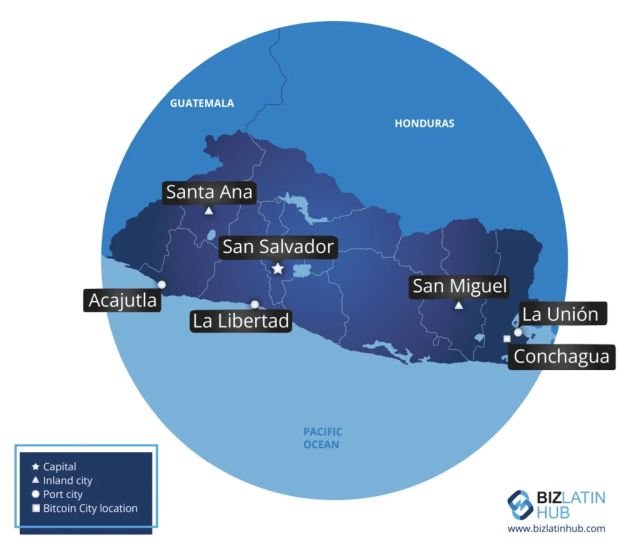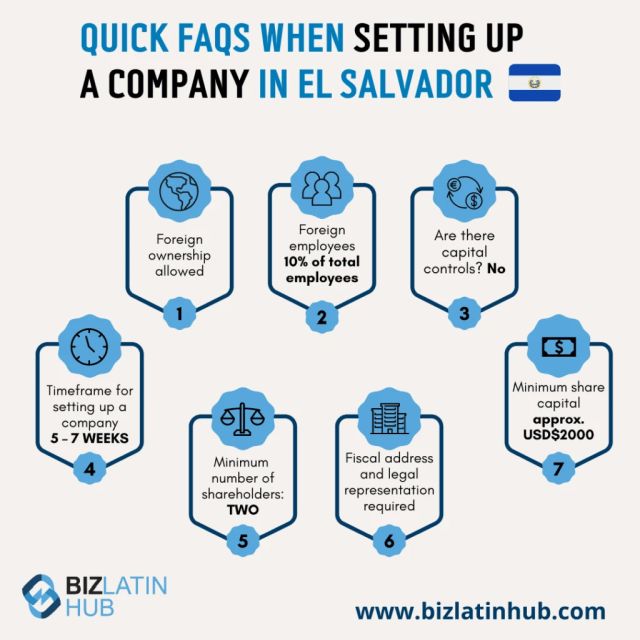Apart from the excellent coffee bean that the nation is famous for, the Salvadoran economy is dependent on exports of sugar, gold, and textiles, while having a well-developed pharmaceutical industry thanks to an increased participation of Indian investors in the Central American country. This has driven an influx of investors looking to incorporate a company in El Salvador, pertaining to these successful industries.
In total, exports and imports make up 64% of the GDP and are, therefore, the most important economic driver of the country. Even though the government under president Sánchez Cerén, who has left office in 2019, has impeded some parts of the private sector, policies that support international trade are active and still very attractive for foreign investors trying to incorporate a company in El Salvador.
Significant to the international trade sector in El Salvador is the multilateral agreement CACM between Costa Rica, El Salvador, Guatemala, Honduras and Nicaragua, and the Free Trade Agreements (FTA) with the European Union, México, Colombia, Taiwan, and the United States.
El Salvador is an overlooked yet attractive commercial jurisdiction that offers some valuable opportunities for international investors, keeping the annual GDP growth at 2.3% (2017). El Salvador, the first nation to recognize Bitcoin as legal currency, has made the decision to do away with all taxes on technological advancements. The Salvadoran president, Nayib Bukele, regarded the technology as a way to fight hyperinflation when he legalized Bitcoin on September 7, 2021. El Salvador has reorganized its Bitcoin investments over the last 18 months and has used capital profits on several occasions to rebuild the country. This move has contributed significantly to foreign investment in the country, as well as many deciding to incorporate a company in El Salvador.
Bukele's continued initiatives to remake El Salvador also include promoting tourism, fighting terrorism, and creating regional commercial hubs in addition to his attempt at a financial comeback. If you decide to incorporate a company in El Salvador, it is crucial that we provide you with an overview of the most important requirements to comply with during the company incorporation process, we have compiled an article to exemplify the key steps.

Incorporate a Company in El Salvador: Get to know the main cities in the country
Company Formation / Incorporation Process in El Salvador
Companies in El Salvador can take on various legal entity forms, depending on their business needs and requirements. Usually, 3 types of legal entities are established in El Salvador, namely Limited Liability Companies, Corporations (S.A. de C.V.) or foreign branch offices. Nevertheless, the Sociedad Anónima de Capital Variable (S.A. de C.V.), which is a limited liability corporation with variable shares and a minimum requirement of two shareholders, is the most widely used legal entity among foreign and local investors looking to incorporate a company in El Salvador. One great advantage of this legal entity type is that the shareholders can indicate several business activities, even though only a small number of those are ultimately executed.
FAQ's with company formation in El Salvador?
During the process of deciding whether or not to incorporate a company in El Salvador, several questions are frequently asked by our clients, including the following:
- Is foreign ownership allowed? – Yes, up to 100% foreign ownership is allowed.
- Can the company sponsor foreign employees? – Yes, however, at least 90% of the employees must be locals.
- Are there capital controls? – No.
- Is there a minimum share capital? – Yes, approx. USD$2000.
- What is the minimum number of shareholders? – There must be at least (2) shareholders.
- Are a fiscal address and legal representation required? – Yes.
- How long does the process take (including the opening of a corporate bank account? – Between 5 and 7 weeks
To keep the overview simple, we have provided the main steps for those interested in how to incorporate a company in El Salvador. We explain the most important additional requisites that must be met by the foreign/local investor when agreeing to incorporate a company in El Salvador.
Incorporation Steps
- Obtain local tax ID numbers for shareholders
- Create and sign the company bylaws
- Pay 5% of the share capital
- Register the company bylaws, initial balance and obtain the license of commerce
- Obtain a local company tax ID number (NRC)
- Open a corporate bank account
- Deposit of the required minimum capital to activate the corporate bank account
- Register the company with all relevant government authorities
Required Company Information
If you have decided to incorporate a company in El Salvador, you will have to consider possible company names and establish the business activities that you will undertake. In addition, the following main points must be taken into consideration:
Company Shareholders
A shareholder takes the form of a natural or legal person (i.e. an individual or a company) that owns part of the company corresponding to the share contribution the person has made. This is useful for those looking at company incorporation in El Salvador and are learning about shareholder regulations within the region, as they differ based on the country.
Additionally, the share contribution is significant as the shareholder´s liability is limited to it. In El Salvador, the Corporate Law denotes that the S.A. de C.V. requires two or more shareholders in order to conduct the business.
Local banks will request additional documentation if the company shareholder is a legal person (i.e. a company), during the process to incorporate a company in El Salvador.

Incorporate a company in El Salvador: Some frequently asked questions
Company Share Capital
In order to incorporate a company in El Salvador, a minimum of USD$2,000 needs to be subscribed during the company incorporation process.
Apart from being the starting capital of the company, the share capital contribution plays a major role when requesting highly-graded bank loans or entering a joint venture. If desired, the share capital can be increased or decreased at any point during or after the incorporation process, but the share capital should be an amount that reflects the company's size and business operations.
As mentioned before, the minimum share capital is USD$2,000, with 5% of the share capital being paid at the moment of the company formation in El Salvador.
The remaining 95% will have to be paid within the first year of the company's operations. Please note that depending on the type of business activities the company will exercise, additional registrations with local authorities may be involved.
Company Local Director / Legal Representative
The Local Director/Legal Representative represents the company and its operations. The Local Director plays an important role in the company to ensure that the company operates in accordance with local law and regulation. Once the legal representative certificate has expired, it can be renewed for another 7 years. Furthermore, a legal substitute for the local director must be appointed in order to comply with regulations regarding company formation in El Salvador.
Fiscal / Legal Address
A fiscal address registration is a necessary requirement for all legal entities that are to incorporate a company in El Salvador and must be recorded by the Salvadoran tax authority (Ministerio de Hacienda). In turn, the newly established company receives its unique taxpayer number (NRC), which identifies the registered address of the company, and as such, will be used for all tax purposes and other official communication.
Corporate Bank Account
The last of the main requisites is the opening of a corporate bank account with a Salvadoran bank. Depending on the local bank chosen, the minimum required capital to open a bank account is between USD$100-USD$500.
DON'T FORGET: All newly opened bank accounts have restrictions on sending and receiving money internationally for the first 3 to 6 months.
Originally published 26 November, 2018 | Updated on: 04 August, 2023
The content of this article is intended to provide a general guide to the subject matter. Specialist advice should be sought about your specific circumstances.

